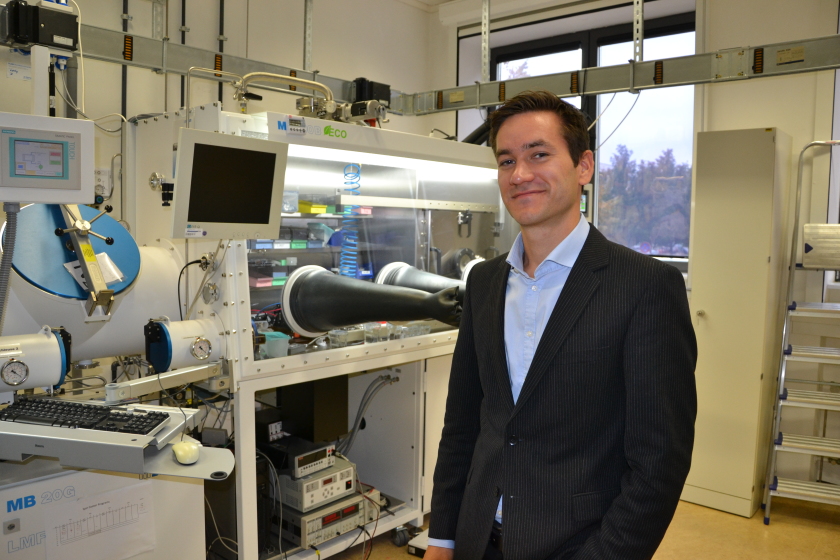Steve Albrecht is Junior Professor at the Technical University of Berlin

Steve Albrecht is heading the junior investigator group "Perovskit Tandem Solar Cells" at the HZB. © A. Kubatzki/HZB
The Technische Universität Berlin (TU) and the Helmholtz-Zentrum Berlin (HZB) have appointed Prof. Dr. Steve Albrecht to the joint junior professorship "perovskite solar cells" as of December 15, 2018. Since 2016, Albrecht has headed the junior investigator group "Perovskit Tandem Solar Cells" at the HZB, which is funded by the Federal Ministry of Education and Research.
With his team of 11, Albrecht researches and develops tandem solar cells that combine the advantages of silicon and perovskite solar cells. If both materials are combined to tandem solar cells, a larger part of the light spectrum can be converted. This increases efficiency. The junior research group recently succeeded in increasing the efficiency of perovskite silicon tandem solar cells to 25.5 percent.
Steve Albrecht will also take on teaching responsibilities at the TU Berlin as part of his junior professorship, including supervising a perovskite internship for students at the HZB.
Albrecht studied and completed his PhD in physics at the University of Potsdam. For his dissertation on organic solar cells he was awarded the Carl Ramsauer Prize of the German Physical Society and the Young Investigators Prize of the Leibniz-Kolleg Potsdam.
At the end of 2014, Albrecht joined the HZB as a postdoctoral researcher and established the research field perovskite solar cells at the center. In 2017, together with Eva Unger, he was in charge of setting up the infrastructure for the HySPRINT Perwoskit Laboratory at the HZB. Today, 40 users work here, producing and characterizing perovskite layers for solar cells using various techniques and methods.
(sz)
https://www.helmholtz-berlin.de/pubbin/news_seite?nid=20260;sprache=en
- Copy link
-
MXene for energy storage: More versatile than expected
MXene materials are promising candidates for a new energy storage technology. However, the processes by which the charge storage takes place were not yet fully understood. A team at HZB has examined, for the first time, individual MXene flakes to explore these processes in detail. Using the in situ Scanning transmission X-ray microscope 'MYSTIIC' at BESSY II, the scientists mapped the chemical states of Titanium atoms on the MXene flake surfaces. The results revealed two distinct redox reactions, depending on the electrolyte. This lays the groundwork for understanding charge transfer processes at the nanoscale and provides a basis for future research aimed at optimising pseudocapacitive energy storage devices.
-
Bernd Rech elected to the BR50 Board of Directors
The Scientific Director at Helmholt-Zentrum Berlin is the new face behind the "Natural Sciences" unit at Berlin Research 50 (BR50). Following the election in December 2025, the constituent meeting of the new BR50 Board of Directors took place on 22 January 2026.
Its members are Michael Hintermüller (Weierstrass Institute, WIAS), Noa K. Ha (German Centre for Integration and Migration Research, DeZIM), Volker Haucke (Leibniz Research Institute for Molecular Pharmacology, FMP), Uta Bielfeldt (German Rheumatism Research Centre Berlin, DRFZ) and Bernd Rech (HZB).
-
A record year for our living lab for building-integrated PV
In 2025, our solar facade in Berlin-Adlershof generated more electricity than in any of the previous four years of operation.
